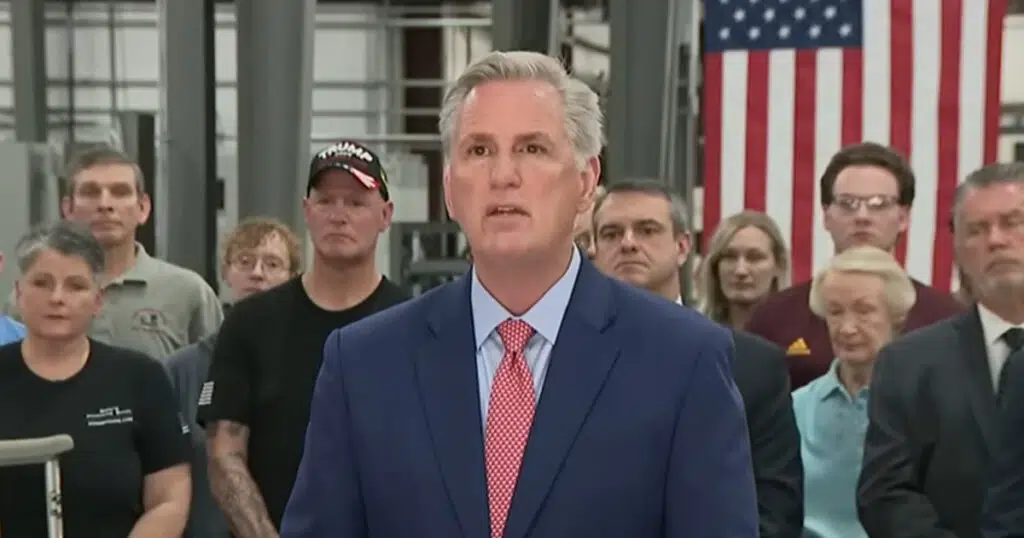
WH: McCarthy, Freedom Caucus Debt Limit Plans Indistinguishable
When the long-awaited Republican plan to raise the debt limit was made public, some White House officials couldn’t shake the distinct feeling they had read it before. Of course, they didn’t like what they read, but it still felt familiar.
Perhaps that is because the proposal released by Speaker Kevin McCarthy at the New York Stock Exchange on Monday borrowed heavily from a similar plan released by the conservative House Freedom Caucus back in March. White House spokesman Andrew Bates told RealClearPolitics that, after flipping between the two, the administration reached at least one conclusion.
“Their leadership has caved to the most extreme MAGA hardliners in their conference,” he said.
The two documents are similar.
The Freedom Caucus wanted to set topline spending at FY2022 levels. They got it into McCarthy’s plan along with a host of other priorities. Limiting spending growth by 1%? Check. Repealing new funding for the IRS? Also check. Ending President Biden’s student loan amnesty, clawing back unspent COVID funds, and revoking green tax credits in his Inflation Reduction Act? Check, check, and check.
Just a few short months after a revolt on the House floor, the new speaker and the same conservatives who almost scuttled his speakership seem remarkably simpatico. At least on paper.
Even if McCarthy can get 218 Republicans to follow him, the plan won’t make it to Biden’s desk. Senate Majority Leader Chuck Schumer has made clear that it is dead-on-arrival in the Senate. But the debt-limit proposal still sets the stage for negotiations over the debt limit, something the White House insists it won’t do.
The McCarthy proposal is an attempt to draw the president out and eventually force him to the table. To do that, GOP brass needs a unified rank-and-file.
Some conservatives groused Monday that McCarthy didn’t go far enough. Arizona Rep. Andy Biggs, a former Freedom Caucus chair, told Axios that keeping nondiscretionary, nondefense spending at 2022 levels is a “long ways away” from his demand to bring it down to pre-pandemic levels.
By Wednesday, there was momentum in the GOP.
On the right: “With what my understanding is of what’s in there,” said Rep. Bob Good of Virginia, a Freedom Caucus member who voted against McCarthy for speaker before relenting, “frankly, we got in there what we asked for.” In the center: “Most of us that I talked to that were in the Biden districts were supportive of it,” Rep. Don Bacon, a moderate from Nebraska, told reporters.
The conservative behemoth, Heritage Action, even gave its blessing in a statement saying that the “plan would rein in the bureaucratic state and put the American economy on track for recovery by limiting federal spending.”
Asked about how Republicans made peace amongst themselves, arriving at a proposal that united leadership and conservative insurgents, a senior GOP aide would only say that “this bill is the result of months of discussions from viewpoints across the conference.”
However the plan came together, the White House is ready to fight it. Bates accused the GOP of “threatening to kill millions of jobs and send retirement accounts into a tailspin unless they can deal a body blow to American manufacturing, raise energy costs, take health care and food from millions, and slash veterans benefits. All while acting to increase the deficit with tax giveaways to the rich.”
“It’s scorched earth partisanship that would decimate the American middle class,” the president’s spokesman added.
Republicans are undeniably more aggressive, even as they call for a return to spending levels that were acceptable just a few short years ago. The same GOP that went along with record spending under former President Trump, voting to raise the debt limit without preconditions when a Republican was in the White House, has become more interested in culture war fights of late, such as combatting “wokeness” in the federal government. Fiscal discipline, in and of itself, hasn’t been the sole objective for some time as Texas Rep. Chip Roy told RCP in January. His goal? “Stop spending money we don’t have to fund the very bureaucrats who are tyrannically undermining our freedom or civil liberties.”
The populist firebrand held out the possibility of a more conservative proposal, one Democrats would have to “choke” on he said Thursday on Fox News, if they don’t negotiate “in good faith.”
There is already enough for Democrats and the White House to object to currently. White House Press Secretary Karine Jean-Pierre told RCP Thursday that the proposal to return unspent pandemic relief money was “bizarre,” even though Biden ended the COVID national emergency this month, and that the idea “just didn’t make sense” because the economy is still dealing with the after affects.
A spokesman for McCarthy, Chad Gilmartin, countered that “reclaiming unspent COVID funds makes perfect sense, especially considering that the end of the pandemic was signaled by President Biden when he signed House Republicans’ bill ending the COVID national emergency.”
Underscoring that Republican sentiment is a February report from the Government Accountability Office that estimated about $90 billion in unspent funds scattered among federal agencies.
Getting that money back won’t be as easy as cancelling checks.
A Biden spokesman warned “that nearly all of the funds have been obligated,” noting that most of the remainder was “for pension relief for blue-collar workers such as teamsters on Long Island and steelworkers in Pennsylvania.” Other funding was headed to veteran health benefits, they noted, and Americans with disabilities. But if that’s the fight that McCarthy and Co. really want, the administration welcomes it. “If Congressional Republicans want to take away money from veteran’s health and pensions for steelworkers,” they said, “they’re going to have to explain that to the American people.”
This article was originally published by RealClearPolitics and made available via RealClearWire.


